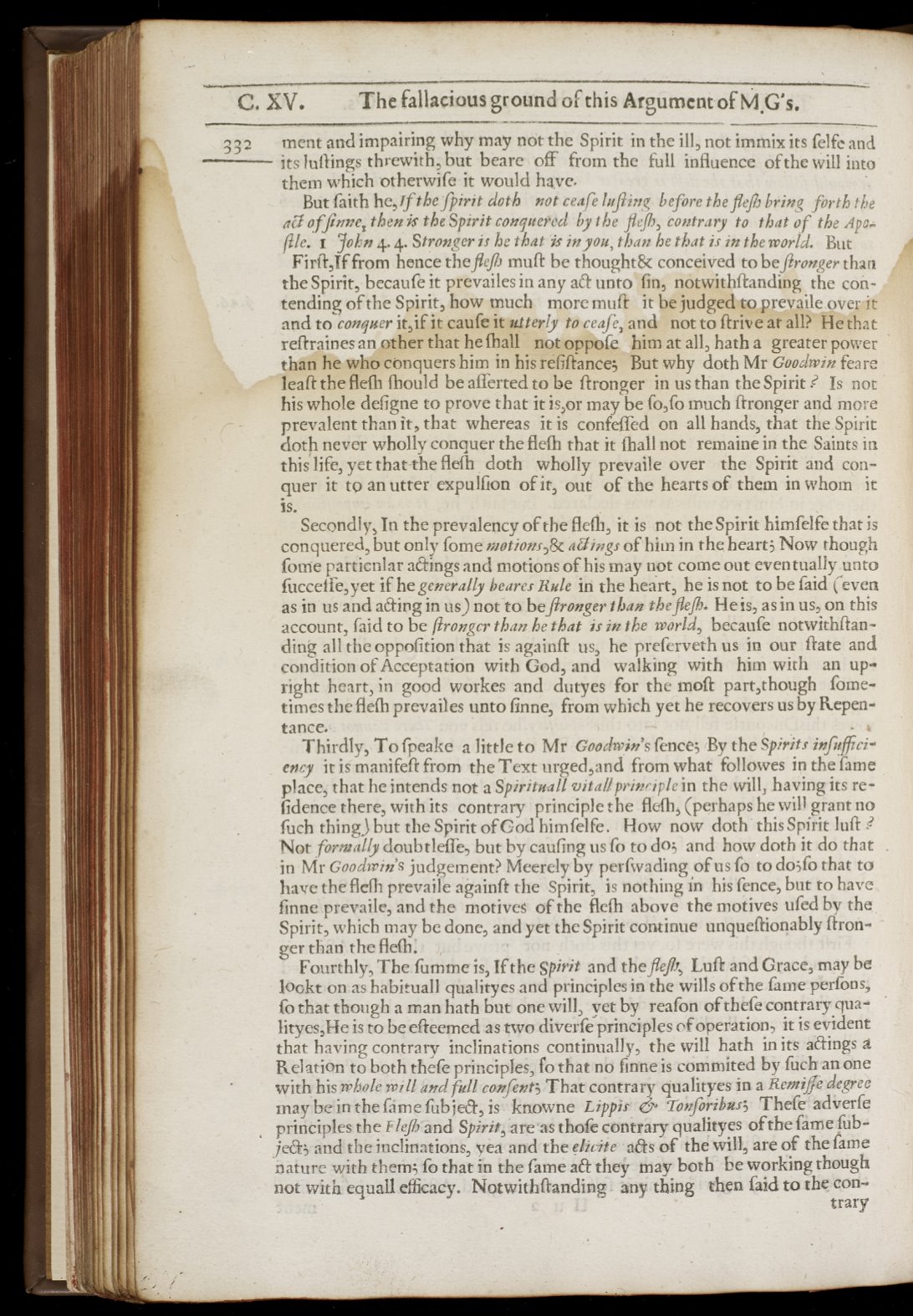

C. XV.
The
fallacious
ground
of
this Argument
of
M
G's.
332
ment and impairing why
may
not the
Spirit
in
the
ill,
not
immix
its
felfe
and
its luflings
threwith,
but beare off
from
the
full influence
of
the
will
into
them
which
otherwife
it
would have.
But
faith he,
if
the
fpirit
cloth
not ceafe!lifting
before
the
flefh
bring
forth
the
aïl
offinnef then is
the Spirit
conquered
by
the
flefh,
contrary
to
that
of
the
Apo,.
file.
[
5ohn
4.4.
Stronger
is he
that
is
inyou,
than
he
that
is
in
the world.
But
Firfl,if
from hence
the
flefb
mutt be thought&
conceived
to
be
flronger
than
the Spirit,
becaufe
it
prevailes
in
any aft
unto
fin,
notwithftanding
the con-
tending
of
the Spirit,
how much more
mutt it
be
judged to
prevaile
over
it
and to
conquer
it,if
it
caufe it
utterly
to
ceaf,
and not
to
ftrive
at
all?
He
that
reftraines
an
other that
he
flail
not oppofe
him
at
all,
hath
a
greater
power
than
he who conquers him
in his
réfiftance; But why
doth
Mr
Goodwin
feare
leaft
the
flefh
fhould be afferted
to
be ftronger
in us
than the
Spirit ?
Is
not
his
whole
defigne
to
prove
that
it
is
?or
may be fo,fo much
fronger
and more
prevalent
than
it,
that
whereas
it
is
confeffed on all
hands,
that
the Spirit
doth
never
wholly conquer
the
flefh
that
it
fhall
not
remaine in
the
Saints
in
this
life,
yet
that
-the flefh
doth
wholly prevaile over the
Spirit and con-
quer it
to an utter
expulfion
of
it, out
of
the
hearts
of
them
in
whom
it
is.
Secondly,
In the
prevalency
of
the
flefh,
it
is
not the
Spirit himfelfe
that
is
conquered,
but
only fome
motions,&
netings
of
him in
the
hearts Now though
Come
partienlar
a
bngs and
motions
of
his
may
not
come
out eventually unto
fucceffe,yet
if
he
generally bearer Rule in
the
heart,
he
is
not to be
Paid
(even
as in
us
and afting
in
us)
not to
be
ffronger
than
the
flefh.
He
is, as
in us, on this
account, laid to be
granger than
he
that
is in
the world,
becaufe
notwithftan-
ding
all
the
oppofition
that
is
againft
us,
he
preferveth
us in
our
Rate and
condition
of
Acceptation with
God,
and walking with
him
with
an
up-
right heart,
in
good workes and dutyes
for the
molt part,though
fome-
times
the
flefh
prevailes
unto
finne,
from
which
yet
he recovers
us
by
Repen-
tance.
4
Thirdly,
To
fpeake
a
little
to
Mr
Goodwin's
fence; By
the
Spirits
infufici-
eney
it
is
manifeft from
the Text urged,and fromwhat
followes
in
the
fame
place,
that
he
intends not
Spirituals
vita
principle in
the
will,
having
its
re-
fidence
there, with
its
contrary
principle
the
flefh,
(perhaps
he
will
grant no
fuch
thing) but
the
Spirit
of
God himfelfe. How now doth
this Spirit luft
?
Not
formally
doubtleffe, but
by
caufing
us fo
to
do; and
how
doth it do that
.
in Mr
Goodwin's
judgement? Meerely
by perfwading
of
us fo
to do;fo that
to
have
the
flefh
prevaile againft
the
Spirit,
is
nothing
in
his fence,
but to
have
finne prevaile, and
the
motives
of
the
flefh
above
the
motives ufed by
the
Spirit,
which may
be done, and yet the
Spirit
continue unqueftionably (iron-
ger than
the
flefh:
Fourthly,
The
fumme
is,
If
the
Spirit
and
the
flefi,
Luft and Grace,
may be
lockt
on
as
habituall
qualityes and principles
in
the
wills
of
the
fame perfons,
fo
that
though
a
man
bath
but
one
will, vet
by
reafon
of
there
contrary
qua
-
lityes,He
is
to
be efteemed
as
two
diverfeprinciples
of
operation, it
is
evident
that
having contrary inclinations continually,
the
will
bath
in
its
a&ings
a
Relation to both
thefe principles,
fo
that
no
finne
is
commited by
fuch an
one
with
his whole
will andfull
content;
That
contrary qualityes
in
a
Kerniffc degree
tnaybein
the
Came
fubje
&,is'
knowne
Lippis
Tonforibus;
Thefe adverfe
principles
the
Fleflr'and
Spirit,
areas
thofe
contrary
qualityes
of
the
fame fub-
je
&;
and
the
inclinations,
tea
and
the
elicite
a
&s
of
the
will, are
of
the
fame
nature
with
them;
fo
that
in
the
fame
a&
they
may
both
be working though
not
with
equal'
efficacy.
Notwithftanding
any
thing then
Paid
to
the
con
-
trary










